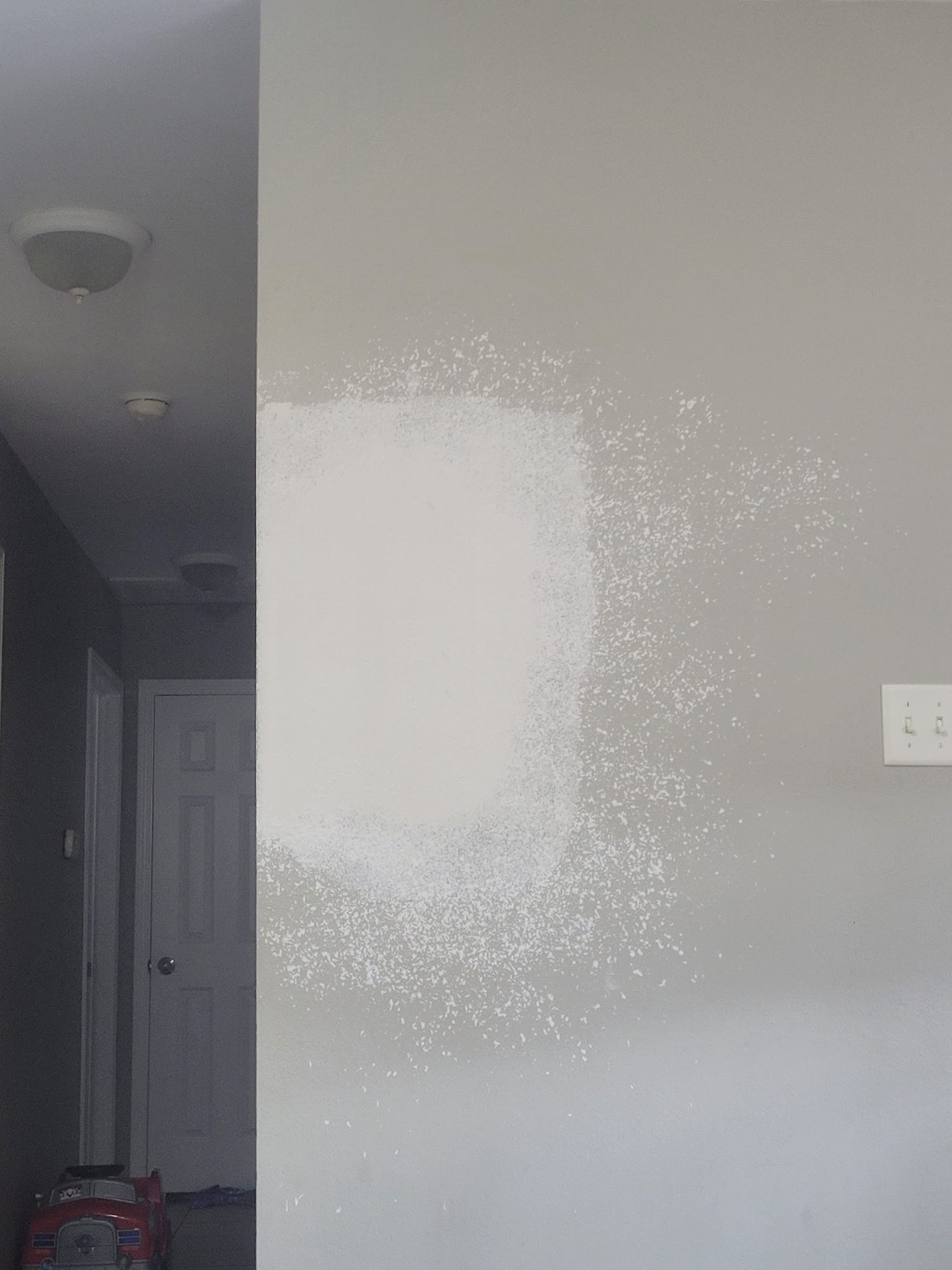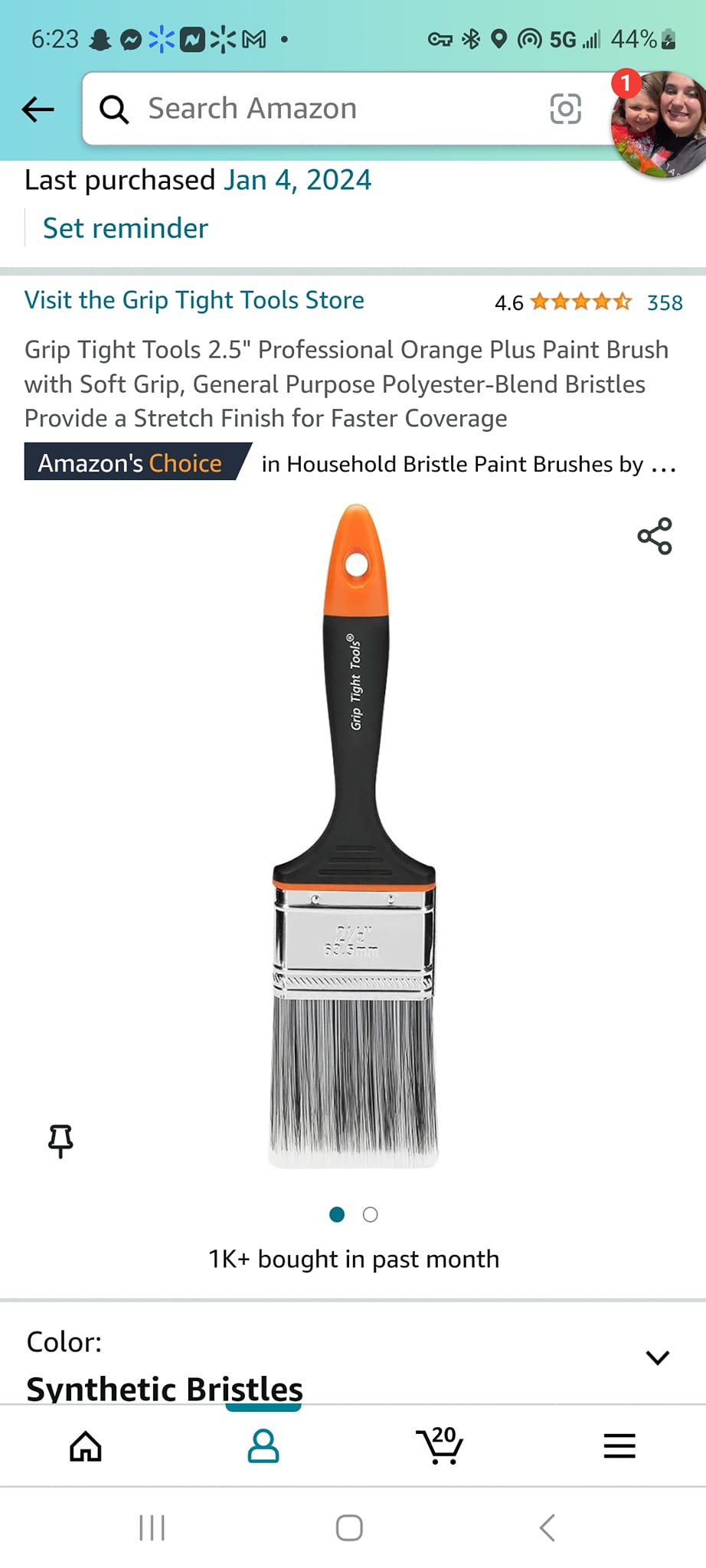How do I use paint and primer in one to touch up a small section of a wall without streaks, especially if the color needs to match existing paint?
8 months ago
Last Updated: October 21, 2024
I have a bit of a silly question – I need to paint a small section of this wall, but I’ve never done it before. I bought paint that’s also a primer, and I have a paint brush ready to go. Do I just need to open the paint, give it a stir, and start painting? Will it dry the same color, and will it end up streaky? 😅 When we moved in, we found a can of the same gray paint in the utility room, which matches the wall color. I feel a bit silly asking, but we accidentally made a hole in the wall while moving things around. We decided to fix it ourselves instead of having the landlord charge us for repairs, but the person who fixed it never came back to paint over it. So, here we are!


I recommend using a roller instead of a brush, especially for smaller areas. The brush strokes will be more noticeable.
That’s a pretty large area for a paintbrush, but it’s doable. I suggest using a roller for a better finish. Pick up a paint tray liner from Home Depot, along with a cheap 4-inch roller with a 3/8 nap for under 10 bucks. Bring the paint can that matches and ask them to shake it with their machine for free. If not, stir it well as it tends to separate over time. Without a paint mixer attached to a drill, it won’t mix properly. Have them mix it while you shop for the rollers.
Watch out – you might get accused of a special landlord treatment. Just kidding. Landlords often face that. I recommend using a 4-inch roller kit with a brush. The new paint may dry a slightly different color due to various factors. To test, paint a small area first and let it dry for a few hours. If it doesn’t blend in, paint the rest of the wall. You can use an 18-inch roller and a 4-inch brush, but a 9-inch roller could work too. Make sure to mix the paint well, especially if it’s been sitting for a while.
Just give the can a good shake by hand, it’s easier than stirring. But stirring works too if you prefer.
Is that patching compound? Without using real primer, you might still see the patched areas. In most houses, walls are rolled. Are yours brushed?
I’d recommend using a roller to paint the entire wall instead of spot painting. It’s quicker and more efficient. You’ll still need a brush for the edges, but rolling the main part of the wall is fast. Plan on 3 coats, maybe just 2 if you have really good paint.
Try doing this: apply a layer over the patched area before painting the entire wall. This way, the patched area will seamlessly blend in.
Hey there! It’s rare for the paint to match perfectly unless it’s a high-quality premixed color (seems similar to agreeable grey, right?)!
It’s surprising how many people suggest rolling the spot. I’m willing to bet I can easily spot the difference if they go that route, even from a distance.
Yep, Jodi. Especially if it’s lower quality paint. Many rental properties use Painter’s Edge or Promar 400. Even if you use paint from the same can six months later, it likely won’t match, especially if it was sprayed on initially.
Consider using a roller
Try using a foam roller instead
To cover the patch effectively, apply two coats of paint using a 4-inch roller, blending it out towards the ceiling and floor.
Opt for a roller and consider purchasing a disposable foam one.
When you apply the paint while it’s wet, it might appear a bit off in color, but no need to worry – once it dries, it will blend in perfectly. I recommend adding a coat of primer to the repaired area before using a roller to paint the spot and a little beyond, then blend it out in every direction.
Make sure you use a primer before painting a wall repair. The paint that combines paint and primer is ideal for covering walls that are already painted or have a dark color. If you skip the primer step, you may end up with flashing and obvious touch-up spots. Trust me, I’ve learned from making this mistake in the past!
Try using a small roller with a half inch nap sleeve to touch up the paint. If you have the original paint, that’s great! If not, start by going corner to corner. Use paint primer and apply the first coat on the patch, allowing it to dry for a few hours. A fan can help speed up the drying process. If you skip this step, you may end up with blisters in some areas when you apply the second coat.
Just mix and roll, it’s that easy! 👍
Mix the paint thoroughly before using it. 🎨
Paint and primer aren’t designed for fixing things. If you use them, the area will stand out – start by priming with the right primer and then apply a top coat with a roller. When you prime, you’ll be able to tell if your repair will blend in. Use 1 coat of primer followed by 2 coats of top coat.
Before we proceed, could you please explain how the wall ended up with a hole in it?
You can check if it still matches, but chances are the new paint will be brighter. It’s recommended to apply multiple coats, maybe around three. Consider using a can of primer like Kilz before painting.
It’s kilz, not kills
Couple of things
1. Can of paint you have, is it Latex or Oil-based paint? The label should indicate it.
2. Purchase a small can of primer to match the type of paint you have. Alternatively, if there is enough paint left in the can, you can just use that. You just need to apply a couple of coats and let it dry in between.
3. Avoid using a brush. Instead, buy a cheap paint tray and roller to use. The staff at Home Depot, Lowes, or Ace Hardware can assist you with this.
4. After applying the first coat of paint, whether it’s Primer or another type, use the roller to paint the spot. Paint in overlapping X’s or W’s, or crisscross. Roll over the larger area and then blend the edges with a drier roller (with less paint on it). This will help blend the spot with the rest of the wall.
Check Google for how to paint or touch up paint, etc. You can also try YouTube for tutorials. This should be your first step.
My mistake
Hey , no worries! That tip was mainly for beginner painters.
The paint may not dry in the same way every time. It all depends on how long it has been since the last coat was applied. Over time, paint can lose its color or undergo slight changes.
Sure thing, make sure to mix the paint thoroughly and scrape the residue from the bottom of the can where the pigments collect. Then start painting. With any luck, the touch-up will blend right in. But keep in mind that paint, just like everything else, can age. If the touch-up is noticeable, consider repainting the entire wall from one end to the other.
If you only touch up certain spots, you’ll be able to see the difference. It’s best to use a roller and cover the entire wall.
Sure, go ahead and mix the paint and grab that paintbrush. After it dries, you might have to apply 3 or 4 coats. Make sure to blend the edges while painting to create a seamless transition with the current paint. Clean the brush with cold water and dish soap after each use. If after 4 coats it still looks like a patch, there are other methods to fix it.
Start by painting the entire wall. Use a brush to cut in along the edges. Apply some paint to the repair area first, let it dry completely, then proceed to paint the whole wall.
It all comes down to the type of finish on the paint. With flat paint, you can easily blend it without much trouble. But if it has a gloss, you’ll need to repaint the entire wall.
If this was painted a while ago, it might have faded due to the sun. Make sure to give the paint a good stir in case it has separated.
If you try to touch up the paint, it won’t dry the same color. You need to roll it on to blend it seamlessly.
Just focus on painting that one wall for now.
When you’re painting, you should grab a mini roller with a 5/8ths colossus. Sherwin Williams sells them. Using a brush will only create brush marks and make it look messy.